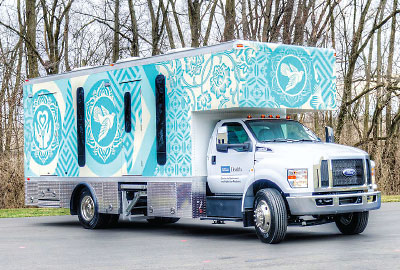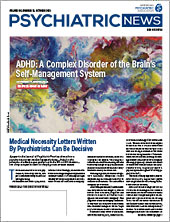Substance use disorders (SUDs) that involve injection drugs carry a high risk of infection with human immunodeficiency virus (HIV). According to the Centers for Disease Control and Prevention, nearly 1 in 10 new HIV diagnoses in the United States is at least partly attributable to the use of illicit injection drugs, and sharing needles is the second riskiest behavior for being infected with HIV. Yet many people who need treatment for either SUD, HIV, or both face multiple barriers to care such as a lack of health insurance, a lack of transportation, and homelessness.
This summer five cities launched one-stop mobile clinics to address the needs of this vulnerable population as part of INTEGRA, a study funded by the National Institute on Drug Abuse and sponsored by the National Institute of Allergy and Infectious Diseases. The mobile clinics, brightly colored RVs staffed by health care professionals and peer navigators, will offer integrated health services to patients in Houston, Los Angeles, New York City (the Bronx), Philadelphia, and Washington, D.C., with opioid use disorder (OUD) who inject drugs.
“The benefit to having a mobile unit is that you can move services to where the people are and go home at the end of the day, as opposed to making people go to where the services are, where they may congregate and local businesses and neighborhood groups may feel they are a problem,” INTEGRA protocol chair Steven Shoptaw, Ph.D., told Psychiatric News. Shoptaw is the director of the Center for Behavioral and Addiction Medicine at the University of California, Los Angeles.
The study aims to enroll 860 people who will be randomly assigned to one of two groups, the control group or the treatment group, for 26 weeks.
Patients in the control group will receive peer navigation to connect them to health services available at community-based agencies. The agencies offer services such as harm reduction; testing for COVID-19; and testing for HIV, sexually transmitted infections, and hepatitis A, B, and C. However, many of these agencies are located in downtown and commercial areas that may be difficult for people with limited transportation options to access.
The treatment group, via the mobile clinics, will be offered the same services available at community agencies, but with the addition of medication treatment with buprenorphine for OUD, naloxone, syringe services where available, pre-exposure prophylaxis (PrEP) for HIV prevention, antiretroviral therapy for HIV treatment, and primary care services. Mobile clinics will be placed in residential areas determined to be accessible for those affected by HIV and those who inject opioids.
“We wanted to provide simple interventions—primary care, testing, treatment, medications, and referrals to psychiatrists and other mental health professionals. We wanted to have everything Beny Primm said patients should have,” Shoptaw said, referring to the late Beny Primm, M.D., a physician who started several of New York City’s first methadone clinics. He later rose to prominence for his expertise in addiction treatment and HIV/AIDS and served in the presidential administrations of Ronald Reagan and George H. W. Bush.
At weeks 26 and 52, the researchers will evaluate both groups’ use of medications for OUD; rates of viral suppression among participants with HIV; use of PrEP among HIV-negative participants; use of opioids and other substances based on participant self-report and urine screenings; drug overdose events; and new diagnoses of HIV, COVID-19, hepatitis C, and sexually transmitted infections. They will also analyze the cost-effectiveness of delivering care through mobile clinics compared with community-based agencies. The researchers hope to have results from the study in 2025. ■
Details of the study are posted
here.
“HIV and Injection Drug Use” is posted
here.

